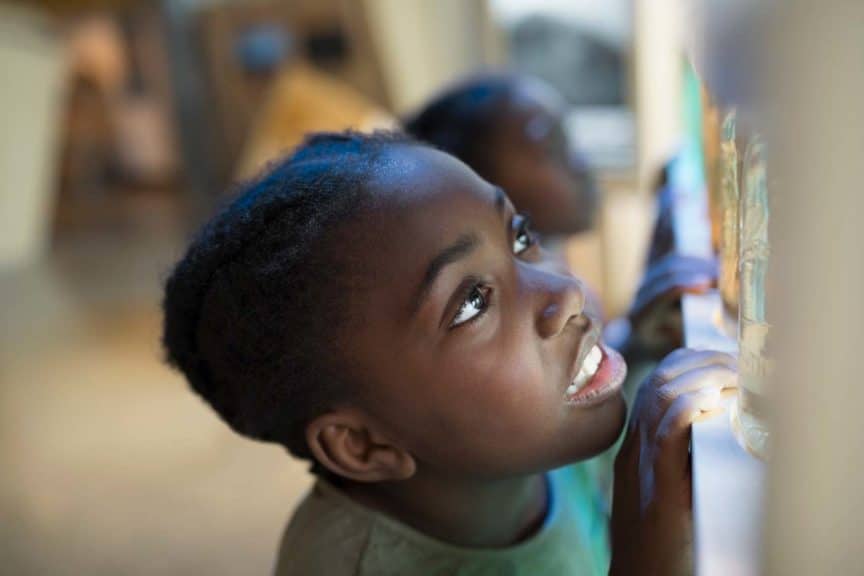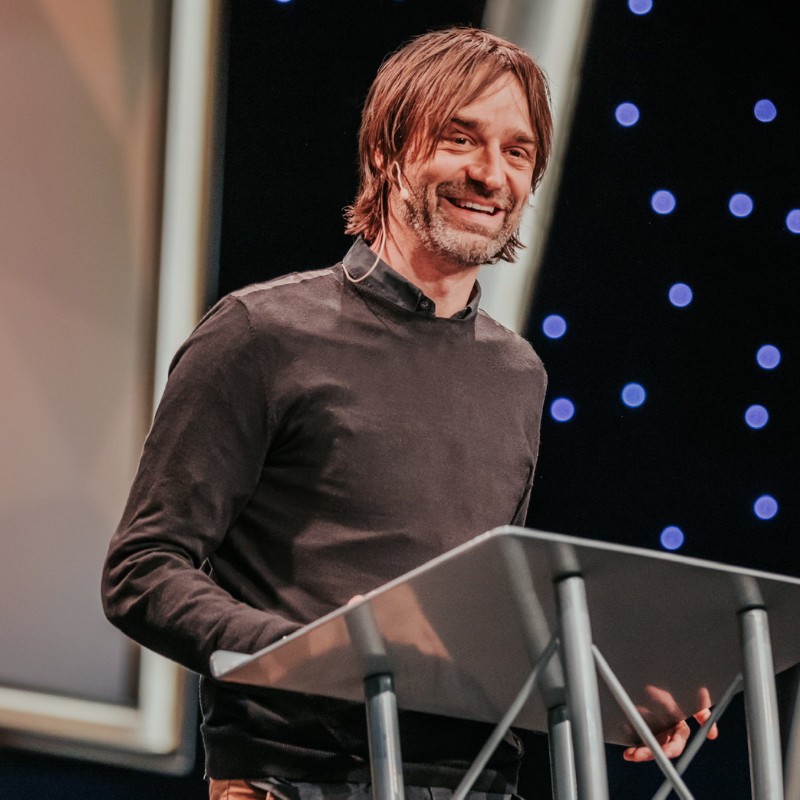When I was a teenager, I would sometimes babysit kids from our church. I had a few basic rules around respect and not tearing the house apart. Other than that, I would let them do and eat whatever they wanted.
I would play board games with them and try my best to get them to think I was cool and fun so they would beg their parents to allow me to watch them again. I didn’t get a lot of repeat business, and, now that I am a parent, I realize those kids totally sold me out. It wasn’t their fault. The problem wasn’t them—it was my faulty business model.
Fast forward several years…I tried to use this same model to make Jesus seem cool and fun to the kids who came to our church. It wasn’t that I didn’t tell them true things about the Bible—we did that. It was that I was trying to apply truth on a foundation that couldn’t sustain that truth.
In short, I wasn’t teaching theology: the study of God. Systematic theology is taking everything the Bible says about any topic and organizing it in categories that kids need today (or will need someday).
I remember thinking as a 21-year-old kid who was serving in his first year of kids’ ministry, “I need to make the Bible exciting and fun. If I can make them like church, they can learn about theology when they get older.”
Children Are Already Theologians
What I understood was how kids need to be engaged, but I failed to realize that every kid in my kids’ ministry was already a theologian. I thought theologians were old, pipe smoking men who at some point decided to go by their initials.

I underestimated a child’s ability to understand and a child’s need to organize truth into “mental containers” they don’t have yet. I never realized that children already are theologians.
In his book Everyone’s a Theologian, R. C. Sproul famously said,
“Every Christian is a theologian. We are always engaged in the activity of learning about the things of God. We are not all theologians in the professional sense, academic sense, but theologians we are, for better or worse.
The ‘for worse’ is no small matter. ….When our thoughts are corrupted, our lives follow suit. All know that people can recite the creeds flawlessly and make A’s in theology courses while living godless lives. We can affirm a sound theology and live an unsound life. Sound theology is not enough to live a godly life. But it is still a requisite for godly living. How can we do the truth without first understanding what the truth is?
No Christian can avoid theology. Everyone has a theology. The issue, then, is not, do we want to have a theology? That’s a given. The real issue is, do we have a sound theology? Do we embrace true or false doctrine?”
R. C. Sproul
Why Churches Are Called to Teach Kids Theology
In the past several years we have rightly emphasized the role parents play in the spiritual development of their children. But parents and kids need the church to help shape those conversations.
In the course of a given day, kids ask many questions about God, the world, and life, and there are still more questions they think about but never ask. It is the job of the church to help parents present the bigness of who God is in such a way that the smallest child can understand.
German theologian Detrich Bonhoeffer would often say, “if one couldn’t communicate the most profound ideas about God and the Bible to children, something was amiss.” (Quoted in Bonhoeffer: Pastor, Martyr, Prophet, Spy by Eric Metaxas, Kindle Edition pg. 64)
Kids have a much higher capacity to know, to understand, and to see God than we can even imagine. We as pastors and leaders need to do the hard work of creating content and pointing parents and volunteers to reliable resources. The language used in these resources helps create those “mental containers” that truth will one day occupy. (See the end of this post for some theology resources I recommend.)
Kids have a much higher capacity to know, to understand, and to see God than we can even imagine.
Why Systematic Theology? Why Not Just Stories from the Bible?
This is an essential question because kids need to understand the whole narrative arc of the Bible. It begins in the perfection of the garden, where humanity’s relationship with God was broken by our sin. That relationship was repaired by the life, death, resurrection, and ascension of Christ, and ultimately the Bible promises to restore all things to the way they were always meant to be.
Kids need to be told that story in every message we preach and in every lesson we write until they can see it for themselves.

We are built for story. We must tell stories. In thinking of my childhood, the books I remember most are the ones whose characters struggled, like me, who felt weak, just like me. As a kid reading books, I didn’t just imagine the scene in my mind—I felt what the characters felt.
Kids need story, yet we too often give them disconnected facts about God.
Kids desperately need the narratives of the Old Testament, but they also need the systematic theology that is more explicit the New Testament.
The challenge in teaching kids stories minus theology is kids tend to think of those stories—and ultimately God—as disconnected from their lives and distant from their situation. Systematics connect their most profound need and their deepest desires and answer life’s most significant questions.
Kids Need Systematic Theology Because
1. Kids Think Thoughts about God.
A few nights ago, I was tucking in my youngest daughter, who is six. She asked me this question:
“Dad, how can Jesus be God, and God be God?” Trinity game on.
I thought, This is my moment. I just finished Systematic Theology. How hard can it be to explain the Trinity to a child?
As it turns out…really hard. The pitfalls are either giving kids information disconnected from their reality, or making the answer so simplistic that it is ultimately unhelpful even if understandable.
I gave my daughter too much information disconnected from what she could see and understand. In response, she grabbed her head and said, “Ooohh, my brain hurts.”
I was grasping for analogies to try to break the Trinity down for her so her brain wouldn’t hurt. But the problem with so many analogies is they fail to express the inexpressible nature of God fully. We can use eggs, water, or the sun to try to explain the oneness and threeness of God, but all those end up simplifying God into something we can understand and control.
We Need to Give Answers That Make Way for Wonder
One of the books we recommend for our leaders and parents is Big Truths for Young Hearts, a systematic theology for kids ages 8–12. In that book, Dr. Bruce Ware gives an excellent example and a great principle for explaining big truths to young hearts:
“The closest thing I’ve imagined to the Trinity is drawing one circle using three colored markers (perhaps red, blue, and green). If you draw the same circle three times, with each color overlapping exactly the previous one, you have one circle. But the red line is not the blue line, and the blue line is not the green line. Yet all three lines enclose only one circle. While this illustration may work in a very small part, the truth is that there simply is nothing in our experience that shows us exactly what the doctrine of the Trinity teaches”
(Big Truths for Young Hearts, Kindle Edition p. 43).
I told my daughter each colored marker represents a different person of the Godhead as I drew a circle with each color on top of each other making only one circle. I asked my daughter how many circles I drew. She said three. I asked her how many circles she saw on the paper. She said one.

I told my daughter each colored marker represents a different person of the Godhead as I drew a circle with each color on top of each other making only one circle. I asked my daughter how many circles I drew. She said three. I asked her how many circles she saw on the paper. She said one.
I love this explanation because it leaves room for wonder, and it tells kids, “Here is what we understand about the Trinity based on what the Bible says and based on statements the church has worked to produce so that we can have as much wonder-filled clarity as is possible this side of eternity.”
I drew out for my daughter Dr. Ware’s circle analogy, and she said: “Oh, we have one God in three persons.” My mouth dropped. I was like Yes, yes we do. In talking to your kids about God, you want to do three things:
- Tell them true things.
- Create categories they won’t understand now but will one day.
- Train them to wonder.
2. Kids Need a Faith They Can Grow Into.
Does my daughter fully grasp the Trinity? No. Do I? Not even close.
The problem is we tend to oversimplify truth we don’t understand or are fearful our kids won’t understand. So we do something worse than fail to answer their question—we give them a small faith in a weak God.
If you have served in kids’ or youth ministry long enough, you will no doubt have heard the infamous stat that says 70% or so of kids who grow up in the church leave after high school never to return.
There are many theories about why that is. I believe the problem is we have given our kids a faith they have grown out of. We have given them just enough of the gospel to inoculate them from the whole of it.
As pastors and leaders, we need to give our kids a faith they can grow into, not a faith they can grow out of. We do this through distilling truth rather than simplifying it. When we simplify truth, we remove whole chunks to make what we are saying more understandable, more user-friendly and, frankly, more anemic.
Distilling truth removes the unnecessary so the essential can shine more clearly. We need to take the faith that has been handed to us through the creeds, Scriptures, and the historic faith and distill it for our kids.
The work of distilling truth is not simple; it is not quick, but it is so important. You have to wrestle with a passage of Scripture, with a theological truth, in such a way that you can allow the core of that passage or truth to shine and do its work in the heart and mind of our kids.
We do something worse than fail to answer their question—we give them a small faith in a weak God.
We Need to Create Containers for Truth
How did my daughter have Trinitarian vocabulary to say that we serve one God in three persons? She made the connection because her teachers were creating containers for truth she didn’t need yet.
She used that language because that’s what she has grown up hearing. For the past three years she has heard the New City Catechism. Its lessons addressed not only her present questions but the ones she would ask in the future.
Even now she doesn’t fully understand, but she is learning to confess what the church has always confessed to being true about God. And when someone tries to convince her of something that isn’t true, she will be able to pull from the resources she received before she could fully understand.
3. Kids Need a Frame of Reference
When kids learn systematic theology, they develop muscle memory that will reflexively recognize truth.
Bible stories are the skeletal system that builds a foundation for kids to connect to and draw from. Systematic theology is the muscular system that gives those stories their proper contact with the world in which we live. Our kids need both.

If we give them only stories, they will never know what to say or how to interact with the world we live in. If we give them only theology without grounding it in Christ and the Scriptures, they will distort the truth because it isn’t being used for its intended purpose.
We need both. We need stories, and we need theology. The goal of theology is the same as the narrative of the Bible. Both should glorify Christ, and both should end in worship.
The Goal of Theology
Theology is not about knowing more to know more. The goal of theology is to know God more and, because of the beauty of who He is, then moved to worship. We are moved to wonder. The story of the Bible starts with a perfect garden and ends in a heavenly city.
This seems like a daunting task. It is. Theology is the study of God. There is no task more significant and no task more deserving of our time and efforts.
Here is the reality: you will never know all there is to know. But you can know more, and if you have seen Christ and believe Him to be all-satisfying, you will want to know Him more.
Your kids need more than answers—they need to see modeled for them what a life lived in pursuit of Christ looks like. They need to understand at a young age that the goal of theology is not knowledge acquisition but worship.
If our theology does not lead to doxology, we have failed to understand its purpose. It is seeing Jesus more clearly and loving Him more dearly. Stories do that and theology empowers that.
My Recommended Resources
One of the things I tell parents is that they don’t have to know every answer themselves, but they do need to know where to look. Below are some resources you may want to use and recommend to families in your ministry.
- The Big God Story by Michelle Anthony
- Big Truths for Young Hearts by Bruce Ware
- The Ology by Marty Machowski
- Bible Doctrine by Wayne Grudem
- On Guard: Defending Your Faith with Reason and Precision by William Lane Craig

66 Short Bible Verses Perfect for Kids to Memorize

66 Short Bible Verses Perfect for Kids to Memorize









